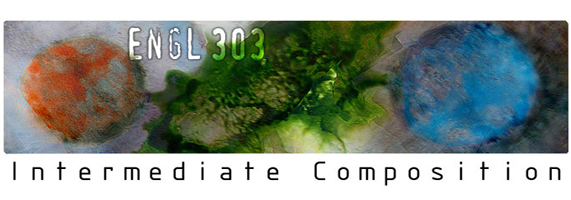
Course Outline
- Seven Modules
- Final Examination
Course Description and Prerequisite
English 303 is an intermediate composition course in which you will study the principles of and practice writing and analyzing non-fiction prose, focusing on argument and academic research strategies. As students, you must be able to communicate within the academic community using techniques both familiar to the practitioners of and particular to the discourse of the discipline. Beyond the university, we have as citizens the opportunity—even obligation—to participate in public discourse. In English 303, you will acquire and polish the tools fundamental to effective writing and reading that will help you to participate successfully in the discourse of the university and beyond.
Prerequisite:
The only prerequisite for English 303 is 6 credits of first year English as taught at UBC or the equivalent. The Department of English expects that a student who has successfully completed six credits of first year English should be able to write a literate and well-argued essay and should be able to read a literary text with some understanding and sensitivity. For practical purposes, this means that you should be able to write an effectively organized and substantial essay that is generally grammatically and syntactically sound, and to identify and discuss prose features such as thesis and purpose and rhetorical features such as figurative language.
Intended Student
English 303 students should be able to write an effectively organized and substantial essay that is generally grammatically and syntactically sound, and to identify and discuss non-fiction prose features such as thesis and purpose, and rhetorical features such as figurative language.
This course will provide students the opportunity to engage in discussion and work collaboratively with classmates, which sometimes requires that students engage in discussions at specific times; deadlines will be firm, students should have some notion of how well and how persistently they can work on their own.
Course Overview
English 303 begins by asking you to examine your own writing habits and motivations and then to “bridge the gap” between the writing “I” and an audience, moving outward into a more public sphere as you practice communicating your ideas to your specific audience, considering issues in your online journals, discussing issues with classmates on the Discussion Board, and posting some of your work in an e-Portfolio.
The course’s major assignment is the Research Paper, which you will work on through the first few months of the course. You’ll also work with stylistic choices, and as you move more into the public sphere with your writing, you’ll begin working collaboratively with classmates, reading and responding to each other’s writing as you prepare to write a collaborative essay and engage in peer responses to each others’ work. Finally, you will analyse a variety of texts for their use of the strategies you’ve learned through the course.
You will engage electronically in class discussions, group exercises (including an online debate!), and collaborative and peer work and will maintain an online e-portfolio that will allow you to evaluate and reflect on your progress through the course.
Course Format
Each of the modules is divided into the following five parts:
I. Introduction: introduces the module’s topics and provides information on the module’s readings, journal and collaborative activities, e-portfolio postings and due dates.
II. Commentary: the bulk of each module is the commentary, which details the study materials for the module.
III. Module Assignments: details the exercises and major writing assignment(s) for the module, and is divided into two parts
IV. Research Paper: Most modules require that you complete a step in the research process as you develop your research paper. Please see “Assignments” on the WebCT left navigation bar for the complete research assignment. Submit each of the research components directly to your instructor as an attachment to a WebCT e-mail.
V. Module Conclusions: These brief sections will quickly summarize the main topics you will have worked on in the module and also give you a glimpse of what is to come in the next module.
Evaluation
Your course grade will be made up as follows:
|
Component
|
Total
|
| Modules 1-4, 6, 7: 5 for writing assignments 1 for exercises, 2 for journals |
48 marks
|
| Module 5: 15 for research paper, 1 for exercises, 2 for journals |
18 marks
|
| Portfolios |
10 marks
|
| Discussion |
12 marks
|
| Final |
12 marks
|
| Total |
100 marks
|
Textbooks
| Required Textbooks | Birks, Roberta, Tomi Eng and Julie Walchli. Landmarks: A Process Reader. 2nd Ed. Toronto: Pearson, 2004. |
| Hult, Christine A., Thomas N. Huckin, Daniel A. Burgoyne, Richard Gooding. The New Century Handbook (packaged with MLA update). Canadian ed. Toronto: Pearson, 2009. | |
| Kolln, Martha and Loretta Gray. Rhetorical Grammar: Grammatical Choices, Rhetorical Effects. 6th ed. Pearson Education Canada, 2009. | |
